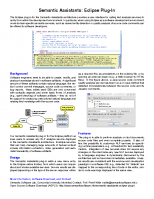- Home
- Research
- SSL for Students
- Projects
- Tools & Resources
- Publications
- Blogs
- Forums
Semantic Assistants
Table of Contents
1. Overview
Semantic Assistants support users in content retrieval, analysis, and development, by offering context-sensitive NLP services directly integrated with common desktop applications (word processors, email clients, Web browsers, ...), web information systems (wikis, portals) and mobile applications (based on Android). They are implemented through an open service-oriented architecture, using Semantic Web ontologies and W3C Web Services.
 Semantic Assistants Overview
Semantic Assistants Overview
1.1. Info Sheets
For the impatient, we have a few info sheets available:
 |
 |
 |
| Architecture Overview | OpenOffice Plug-In | Eclipse Plug-in |
2. Download
The current release is a beta-version; the distribution contains the server, CSAL, clients (Eclipse, OpenOffice, Command Line), ontologies, example pipelines and service descriptions, as well as the documentation:
- Download the latest build (may be unstable) from our Jenkins server or browse the repository.
- You can also download the latest version of the user's and developer's guide.
- There is an Installer (still under development) that helps you in setting up your own Semantic Assistants server.
For questions or support, please post to the semantic-assist-users mailing list.
3. Development
The source code is hosted on SourceForge; please contact us if you would like to contribute code.
- If you have a Subversion client, you can check out the code directly from the repository:
svn checkout http://svn.code.sf.net/p/semantic-assist/code/trunk semantic-assist
Note: the URL changed on November 05, 2012, due an internal update at SourceForge. If you already checked out the repository on or before that date, you will need to checkout a fresh copy from the new URL to get future updates.
- A dedicated Jenkins server is performing continuous integration and nightly builds.
4. License
![]() The Semantic Assistants architecture, clients, and resources are published under the GNU Affero General Public License v3 (AGPL3).
The Semantic Assistants architecture, clients, and resources are published under the GNU Affero General Public License v3 (AGPL3).



